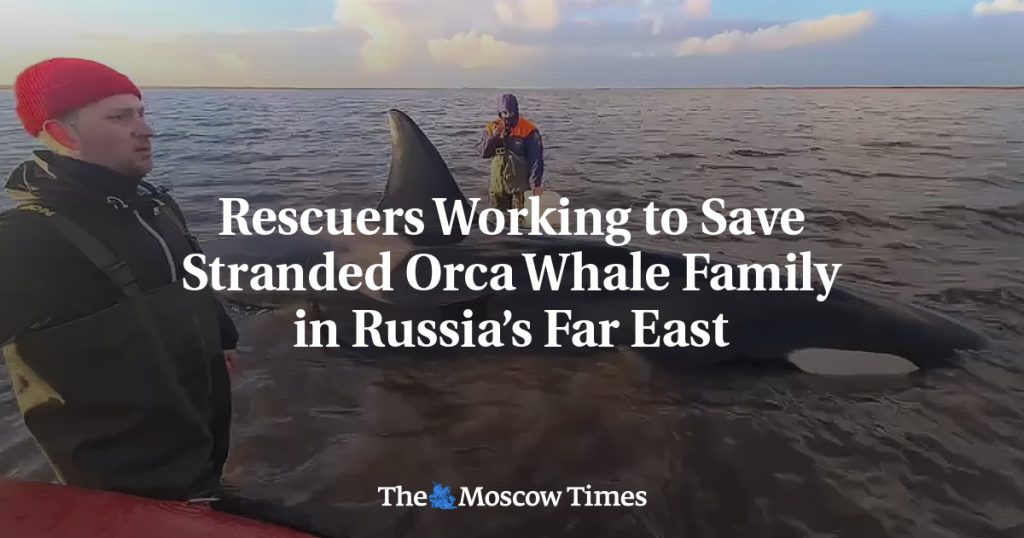The rescue operation to release a family of four killer whales from shallow waters off Far East Russia’s Kamchatka Peninsula continued for a second day, as the Russia’s Emergency Situations Ministry reported that the two orcas and two calves were caught in a low tide in the Sea of Okhotsk. Videos published on the ministry’s social media account showed rescuers dousing the animals in buckets of water to help them breathe. The animals were being manually moved to a deeper place so they could swim to the open sea at high tide, as the bottom of the estuary was covered with silt and unapproachable by machinery. Over two dozen employees and volunteers were involved in the rescue operation.
The animals remained stranded approximately 2 kilometers (1.2 miles) from where they were initially found, according to the Russia’s Emergency Situations Ministry. The ministry hoped for the high tide to help the orcas find their way home, with regional emergency chief Sergei Lebedev mentioning that the tide was expected at 9:02 p.m. local time. The rescue operation was a combined effort of rescuers, volunteers, and emergency officials working together to safely move the orcas to deeper waters. The ministry released updates on the situation and the progress being made to ensure the animals’ well-being.
The Moscow Times issued an urgent message to their readers, highlighting the challenges faced by the organization due to being designated as an “undesirable” by Russia’s Prosecutor General’s Office. This designation puts their staff at risk of prosecution and criminalizes their work as independent journalists. The Moscow Times emphasized their commitment to providing accurate and unbiased reporting on Russia, despite facing attempts to silence them. They appealed to their readers for support, stating that every contribution, no matter how small, would make a significant impact on their ability to continue their work in the face of repression.
The rescue operation for the killer whales highlighted the dedication of the emergency officials, volunteers, and employees involved in ensuring the safety and well-being of the animals. The combined efforts of the rescuers in manually moving the orcas to deeper waters showcased their commitment to saving the stranded whales. The high tide was expected to aid in the orcas’ return to the open sea, providing hope for a successful resolution to the rescue operation. The ongoing updates from the Russia’s Emergency Situations Ministry kept the public informed about the progress and developments in the situation, underscoring the importance of transparency in such operations.
Despite the challenges faced by independent journalism in Russia, organizations like The Moscow Times continue to uphold their commitment to providing accurate and unbiased reporting. The efforts to silence independent media outlets reflect the broader issues of press freedom and censorship in the country. The message from The Moscow Times served as a call to action for readers to support their work and defend open journalism in the face of repression. The urgency of the situation highlighted the importance of standing with independent media outlets in the fight for freedom of expression and access to information.















